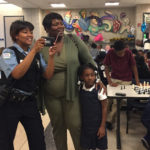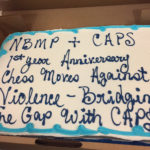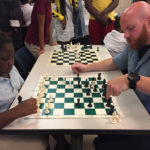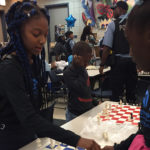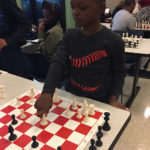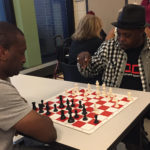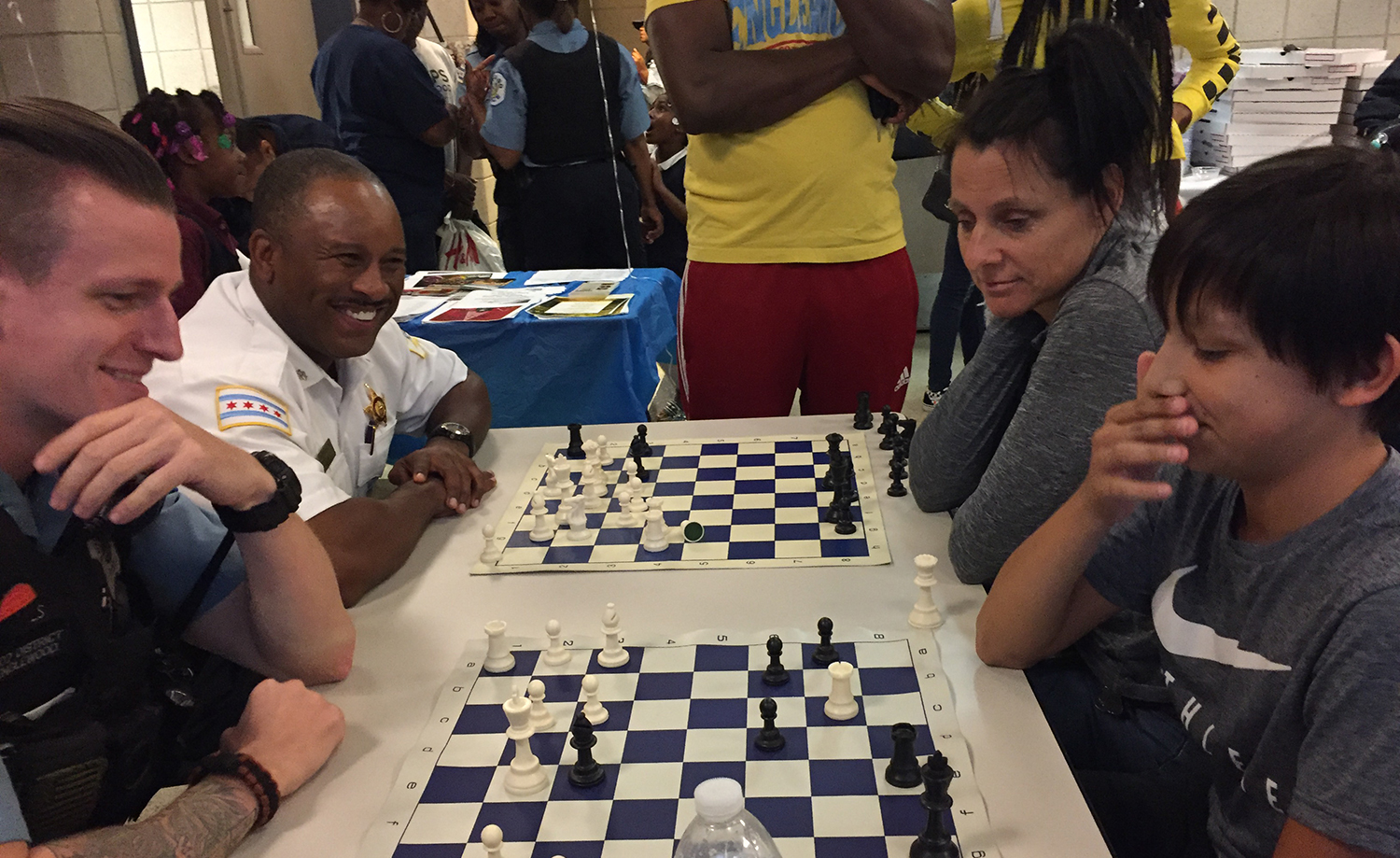
Check[In], Mate
Safe & Peaceful grantee structures chess as a conduit to counteract the cycles of violence, conciliate its casualties, and connect police with communities
Eight-year-old Terriah Pascal is always eager to challenge the cops. She has been doing it monthly for the past year.
She’s no troublemaker, though.
Terriah is among the youth who participate in Not Before My Parents (NBMP) Chess Moves Against Violence: Bridging the Gap with CAPS. An expansion of the NBMP chess club, Bridging the Gap with CAPS aims to use chess as a way to help youth to consider potential outcomes of their daily choices, bringing community members and police together at the Englewood District police station for both chess lessons and matches.
Raydell Lacey founded Not Before My Parents in 2012, prompted by the 1994 killing of her 21-year-old daughter, Elonda D. Lacey. She added the chess club in 2016 after her 19-year-old grandson, Erick L. Lacey Jr., was killed. she’d observed how her son, Erick L. Lacey Sr., used the game to cope with the violent death of his son.
“I said, [here’s] a tool that can help children avoid violence — it keeps their minds in a strategic method of thinking before they act; if you make this move, that’s going happen,” Lacey said, extrapolating that mode of thinking to real-life situations that young people may face. “If I hang out with my friends, what’s going to happen? Suppose the police show up, what’s going to happen?”
It started with weekly sessions at Lafayette Plaza, then expanded to other locations. On September 11, the NBMP-CAPS partnership celebrated its one year anniversary of monthly lessons and matches at the 007th District Police Station, 1438 W. 63rd St.
Sergeant Janice Wilson, who’d met Lacey at a 2016 Coffee with a Cop event, lobbied to get her to bring the program to the Englewood police station last year.
“We welcome everybody to come and be a part of it, all ages,” Wilson said. “We wanted the police station to be a positive platform in the community, someplace that you’re not afraid to come, someplace we welcome you.”
District Commander Roderick Robinson greeted the participants at the anniversary event. “It’s great to have the community as a whole come together and make this something we can really be proud of — Englewood kids and parents and residents can come together and do something really nice as far as chess and teaching them how to play chess,” he said.
“We want officers to see their children in our children, to have a positive outlook on our children, especially since you guys are going to be working in our community and growing up in our community,” she said. “When the officer is playing chess with the kids, they’re growing up with the kids — I wanted them to take time and dialogue with these kids, and mentor these kids.”
“If a situation occurs with the kid, they can handle it without pulling out their guns or a stun gun,” she added. “You don’t all the time have to pull out your weapon, you don’t all the time have to put your foot on their neck.”
Bridging the Gap with CAPS participants range from neighborhood tots to community organizers to veteran players, and the program has allowed them to discover other connections that help relationships cement and thrive. For example, Officer Cametia Middleton, who brings her children to the meetings, has a brother who plays in a chess club with Lacey’s son.
“Hopefully they can build relationships with us and use them through life,” Middleton said.
Officer Cortez Cox said he’s sharpened his skills playing chess at the events. “It was a blessing to see all the kids and the adults. Everybody can learn, [even] people who’ve never played before. And they have professionals who can help you; there are some people here who have played 20 or 30 years.”
“I’m pretty good, but some of the kids who’ve never played before, I teach them a little. And by teaching them, I’m learning too.” Cox continued. “I teach them chess and then start talking to them so they’re comfortable with me. So if they see me on the street I’ve got a relationship with them.”
Middleton stressed that those relationships can form expectations that influence whether or not a young person entertains scenarios that may encourage or lead to violence. And those strategic lessons can come early and often.
“Sometimes it makes a difference,” Terriah said, noting a time when she did not physically retaliate against a girl who hit her. “I was going to put my hands on her, but I’d get in big trouble.”
This is a story about the Community Safety and Peace strategy of the Partnership for Safe and Peaceful Communities.


